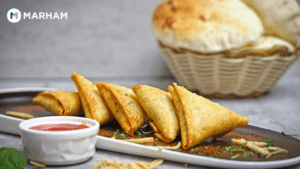Irritable bowel syndrome (IBS) is a chronic condition that affects the gastrointestinal tract (stomach and intestines). Some foods can trigger and affect the quality of life if you have irritable bowel syndrome (IBS). They can cause symptoms of abdominal pain, bloating, constipation, diarrhea, changes in bowel habits, etc.
Highlights:
- Irritable bowel syndrome is a chronic condition and requires lifestyle modifications.
- Foods with high FODMAPs can trigger and worsen the symptoms of IBS.
- Dairy products, caffeine, cruciferous veggies, chocolates, etc can cause indigestion and symptoms of IBS.
- Fried and ultra-processed foods should be avoided if you’ve got IBS.
Stress, oversensitive nerves in the gut, family history, low-grade inflammation, and food passing through the gut too slowly or too quickly are some of the causes of IBS. But the exact cause is still unknown. It is a chronic disease that lasts for a lifetime.
People with IBS find that some foods can trigger or elevate their condition. Some people avoid certain foods like dairy, vegetables, gluten, etc to avoid any flare-ups.
This blog post will look into 7 foods that commonly cause an IBS flare-up. Moreover, if you’ve IBS or any other gastrointestinal disease, then it is better to consult a professional gastroenterologist in Pakistan.
7 Foods to Avoid With Irritable Bowel Syndrome
While there is no cure for IBS, you can avoid certain foods and make some lifestyle modifications to manage the condition. Here is a list of major foods that can trigger IBS and cause a flare-up:
1. Milk (Dairy Products)
Dairy products cause problems and aggravate the condition of patients with IBS. Heavy cream, cheese, ice cream, high-fat milk, etc can cause flare-ups in people with Irritable Bowel Syndrome. High amounts of lactose and fat present in dairy products can cause diarrhea and bloating.
Many people with IBS say that their symptoms are triggered when they eat foods with dairy products. However, it is not clear that people with IBS also have lactose intolerance.
If having dairy foods causes flare-ups, then you can switch to lactose-free milk, plant-based milk, soy-based cheese, or other dairy alternatives. You can also take lactase enzyme while having dairy products.
A study conducted in 2017 suggests that it is better to take calcium-rich foods as compared to calcium supplements.


Useful Tip: If dairy products worsen your condition, then you have to completely cut out milk-based products. In that case, you must acquire calcium from other calcium-rich foods and supplements.
2. Fried Foods
Fried foods are cooked in unhealthy oils and fats. These unhealthy fats are hard to process and digest. Moreover, meals that have high amounts of sugar and fat can quickly pass through the body (undigested). This causes abdominal pain and diarrhea.
Research in 2013 showed that many people with IBS had symptoms after eating fatty and fried foods.
Apart from this, fried foods can also harm the health of a normal person. Donuts, fried chicken, french fries, egg rolls, etc can worsen the symptoms.


Useful Tip: Therefore, to avoid any worsening of the condition, it is better to eat grilled, air-fried, or baked foods.
3. Caffeine
Caffeine stimulates and boosts the central nervous system. It can increase the movement of food through the gut.
In people with Irritable Bowel Syndrome, caffeinated drinks can cause abdominal pain and diarrhea. This is especially true when you take caffeine on an empty stomach.
Some high sources of caffeine include:
- Coffee
- Tea
- Beverages
- Chocolates
- Sodas
- Energy Drinks, etc


Useful Tip: If you take caffeinated drinks to boost and keep yourself awake, then you can try alternatives. You can do exercise or practice yoga. Moreover, you can also divert to low-caffeine alternatives like white or green tea.
4. Highly Processed Foods
Ultra-processed foods typically have ingredients that are not present in the food that you cook at home. Highly processed foods have high amounts of additives, fat, sugar, salt, lactose, etc. These ingredients, in high quantities, can trigger the symptoms of Irritable Bowel Syndrome.
Eating processed foods can cause health issues for any healthy person. Moreover, these foods also have high quantities of preservatives and additives that can cause flare-ups in IBS patients.
Some highly processed foods are given as follows:
- Chips
- Processed Meat like Fish Sticks or Hot Dog
- Breakfast Cereals
- Fried Food
- Protein and Energy Bars with Added Sweeteners
- Canned Foods
- Freeze Foods
A review was given in 2019 that suggests that eating four servings of processed foods per day can cause IBS. Moreover, it can also cause obesity, cancer, and high blood pressure.


Useful Tip: The best alternative to processed food is to cook a fresh meal at home and enjoy it. Rather than, going out and having processed meals.
5. Cruciferous Vegetables
Cruciferous vegetables such as broccoli and cauliflower contain a sugar called Raffinose. Foods enriched with Raffinose sugar stay in the gut and are undigestable until they are processed by the gut bacteria. Hence, if you do not have “Good gut bacteria”, then these foods remain undigestable. This can cause abdominal pain, gas, and bloating in IBS patients.
Some of the cruciferous vegetables that you should avoid if you’ve IBS are as follows:
- Broccoli
- Brussels sprouts
- Kale
- Cauliflower
- Cabbage (including sauerkraut)
- Radishes
- Arugula
- Bok choy
- Collard greens
- Watercress
If cruciferous vegetables trigger your IBS, then eat high quantities of other vegetables. Therefore, you will not miss out on any important nutrients.


Useful Tip: Some of the healthy alternatives to cruciferous veggies are spinach, sweet potatoes, squash, zucchini, green beans, and celery. Moreover, it is better to eat cooked veggies if you’ve IBS. Consider sautéing, boiling, or roasting them instead of eating them raw.
6. Artificial Sweeteners
Whether you’re a healthy person or an IBS patient, sugar-free doesn’t mean it is good for your health. In place of sugar, many sugar-free foods and drinks have artificial sweeteners. Some of the sugar-free sweeteners are:
- Artificial Sweeteners, such as Aspartame, Sucralose, Acesulfame Potassium
- Sugar Alcohols, Including Mannitol, Xylitol and Sorbitol
- Natural Zero-Calorie Sweeteners like Stevia
- Corn Syrup with High Fructose
Research conducted in 2017 also showed that sugar alcohols are also hard for the body to absorb, specifically in IBS patients. The sugar alcohols can cause digestive discomfort, gas, and other laxative effects.
Moreover, a study conducted in 2021 showed that artificial sweeteners affect the gut microbiome and also cause inflammation.


Useful Tip: It is better to read the ingredients mentioned in the products and avoid products that have sugar-free sweeteners.
7. FODMAP Foods
FODMAPs are foods that have hard-to-digest carbs. As these carbohydrates are hard to digest and absorb, they can affect the small intestine and take excess water to the bowel. This can result in bloating, diarrhea, and gas. FODMAP is an acronym that stands for:
Fermentable
Oligosaccharides
Disaccharides
Monosaccharides
And
Polyols
Research conducted in 2017 also suggests that foods with high FODMAPs can worsen the symptoms of IBS. Foods with high FODMAPs include:
- Dairy Products
- Vegetables like peas, cauliflower, cabbage, onion, etc
- Corn Syrup and Honey
- Cashwes & Pichtacios
- Gum or Candy Having Sweeteners
- Wheat and Rye Products (Baked Products)
- Some fruits and their Juices such as Apples, Mangoes, Pears, Plums, Apricots, Cherries, etc
Useful Tip: It is better to have a diet with Low FODMAPs. A low FODMAP diet is not rich in hard-to-digest carbohydrates.
Foods that are low in FODMAPs are as follows:
- Eggs
- Fish
- Hard Cheeses
- Oils and Butters
- Lactose-Free Dairy Products
- Sunflower, Sesame, and Pumpkin Seeds
- High Fiber Foods
Final Words
Everyone’s digestive system functions differently. A person with IBS might digest lactose foods, but on the other hand, a person with IBS might not be able to process and digest lactose.
Therefore, pay close attention to the foods and drinks to take. Make a checklist (food symptom diary) that can determine which foods suit you and which don’t and then eat accordingly.
You can manage the Irritable Bowel Syndrome symptoms by avoiding the foods mentioned above and improving your lifestyle habits. If you’re still facing issues, then make an appointment with one of our best gastroenterologists in Pakistan.
Frequently Asked Questions (FAQs)
1. What Should I Eat Every Day with IBS?
If you’ve IBS, then you should eat foods with low FODMAPs and high fiber. You can also consume fermented foods, as they are good for the gut microbiome of people with IBS.
2. Are Bananas Good for IBS?
3. Is Rice Bad for IBS?
Rice is the safest food for people with IBS. They can have rice if they are having symptoms of IBS.

